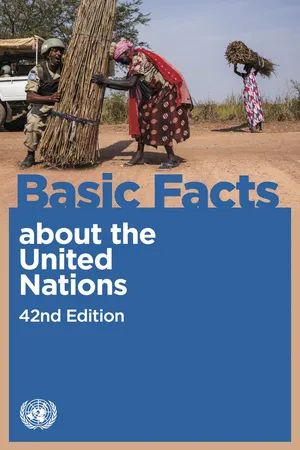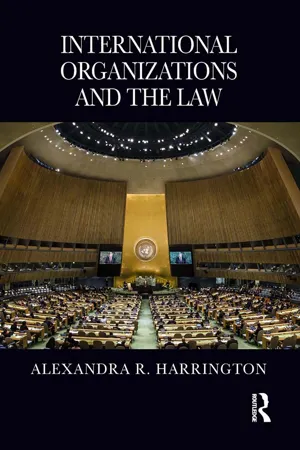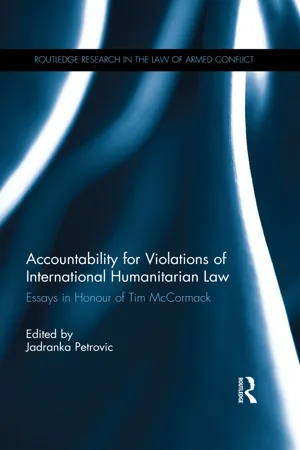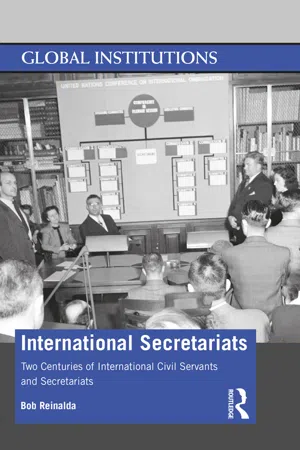International Court of Justice
The International Court of Justice (ICJ) is the principal judicial organ of the United Nations, established to settle legal disputes between states and give advisory opinions on legal questions referred by authorized UN organs and specialized agencies. It is located in The Hague, Netherlands, and plays a crucial role in promoting peaceful resolution of international conflicts through legal means.
4 Key excerpts on "International Court of Justice"
- eBook - ePub
- United Nations Department of Public Information(Author)
- 2017(Publication Date)
- United Nations(Publisher)
...The UN Secretary-General is the depositary of more than 560 multilateral agreements covering a broad range of subject matters (treaties.un.org). The UN and its organs also play unique roles in the peaceful settlement of disputes. From providing a standing court where states can lawfully resolve their grievances, to establishing ad hoc tribunals in the aftermath of armed conflict, the UN is key to upholding international law and reaffirming its place as a cornerstone of international relations. JUDICIAL SETTLEMENT OF DISPUTES The primary United Nations organ for the settlement of disputes is its principal judicial organ, the International Court of Justice (ICJ) (www.icj-cij.org). Also known as the “World Court”, ICJ is the only court of a universal character with general jurisdiction; this is reflected by the wide range of states parties appearing before it, and of the issues it has been asked to address. Since its founding in 1946, the Court has considered 164 cases, and issued over 120 judgments and over 150 judicial orders on legal disputes brought to it by UN member states. It has also issued 27 advisory opinions in response to requests by UN organizations. ICJ has become increasingly busy in recent years. As at 12 October 2016, it had 11 active cases on its docket relating to disputes from all corners of the globe. States are increasingly turning to the Court to resolve disputes relating to treaty interpretation, land and maritime frontiers, the environment and the conservation of living resources, and other issues. Consequently, the Court has delivered more judgments in the last 24 years than during the first 44 years of its existence. ICJ has developed a particularly strong reputation in adjudicating land and maritime boundary disputes, in which tensions between states can escalate into open conflict...
- eBook - ePub
- Alexandra R. Harrington(Author)
- 2018(Publication Date)
- Routledge(Publisher)
...The ICJ may hear disputes between States only, 10 although it may receive information regarding the practices of an international organization 11 and it is possible for the foundational text of an international organization to provide that intractable disputes between the organization’s Member States may be referred to ICJ settlement. 12 In addition to issuing standard judicial opinions, the ICJ has the ability to issue advisory opinions 13 and has indeed done so in cases that involve disputes between Member States of international organizations. 14 Dispute settlement in regional organizations Unlike the UN dispute settlement mechanisms, which typically can be resolved at the ICJ level, regional organizations tend not to be as reliant on an outside judicial entity as the ultimate arbiter of a dispute, although there are instances where it can be used as a court of last resort. Rather, regardless of the region discussed, the focus tends to be on providing multiple layers of alternate dispute resolution-based bodies that can be used to provide insights and incentives for the parties to a dispute. The exception to this is the European Union (EU), but even in that system there is a preference for organization-based resolution of member disputes rather than taking such matters to the ICJ. Dispute settlement in financial and banking organizations The majority of key international financial organizations have provisions regarding dispute settlement mechanisms within their foundational texts. While there is some reliance on outside assistance in carrying out the terms of these provisions, as a trend international financial organizations also tend to be insular in resolving these disputes...
- eBook - ePub
Accountability for Violations of International Humanitarian Law
Essays in Honour of Tim McCormack
- Jadranka Petrovic, Jadranka Petrovic(Authors)
- 2015(Publication Date)
- Routledge(Publisher)
...This part sets the scene for the second part of the chapter, namely examining the Bosnian Genocide Case and the Kosovo Opinion, and the implications they have on the Court’s role as outlined in Part I. Finally, the chapter examines whether the Court can be trusted, that is, whether it is sufficiently free of political influence. The chapter argues that the Court exercises its judicial functions free of political influence and that indeed it has made a significant contribution to the area of accountability for war crimes. II. Role of the ICJ The ICJ is the principal judicial organ of the UN. 16 As such the Court’s role is to assist the UN to achieve its prime objective: the maintenance of peace and security. 17 The ICJ is empowered by its Statute to do this in two ways: first, by resolving disputes between States in its contentious jurisdiction, and second, through the provision of an Advisory Opinion, which aims to answer a legal question that would assist the UN political organs in their duties. 18 Raimondo, writing in 2007, argues that there is a third way in which the Court assists the international community: shaping the norms to govern international humanitarian law. 19 Many commentators would agree that the Court makes a significant contribution to the maintenance of peace and security through the refinement, clarification and development of norms of international law, but they refer to areas other than international humanitarian law. 20 Raimondo argues that clarification and development of norms of international laws are as important as determining accountability for offences. 21 A...
- eBook - ePub
International Secretariats
Two Centuries of International Civil Servants and Secretariats
- Bob Reinalda(Author)
- 2020(Publication Date)
- Routledge(Publisher)
...10 International courts and tribunals • The International Court of Justice • Administrative tribunals • War crimes: Nuremberg and Tokyo • Creating international criminal courts • The International Tribunal for the Law of the Sea • The Permanent Court of Arbitration revived • Conclusion International courts and tribunals are IGOs, both by their very nature and as a part of multilateralism, with an international staff and administrative roles for registrars and prosecutors. The International Court of Justice As the Permanent Court of International Justice was inoperative after 1939 and could be linked to the asserted inactivity of the League of Nations, the Allies decided to create a new international court. An Inter-Allied Committee, set up in early 1943, produced a report in early 1944 which concluded that in the interest of continuity (for instance, regarding references to the Court in existing treaties) the new Court was to have a statute based on that of the Permanent Court. At Dumbarton Oaks, the Allies decided that the UN would also have a legal dimension and, to give it a stronger position, they made it a principal organ of the new peace organization. A group of legal experts from 44 states drew up a draft statute, which was further elaborated at the San Francisco Conference. The International Court of Justice (ICJ) was incorporated into the UN Charter (Chapter XIV, articles 92–96) and its Statute contained 70 articles. In October 1945, the Permanent Court met to disband itself and pass on all its possessions to its successor. The ICJ decided to hold its inaugural session in The Hague, where it was accommodated in the Peace Palace and met for the first time in April 1946. Article 21.2 of the ICJ Statute empowers the Court to appoint its registrar and provide for the appointment of other officers. The power to appoint its own staff distinguishes the Court from the other principal organs of the UN...



